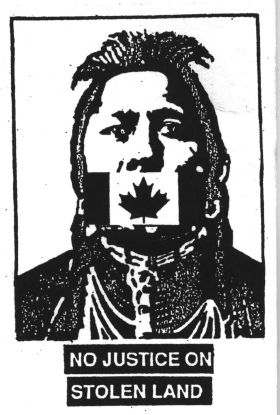Native Resistance Threatens Olympic Illusions
First nations activists threaten picture
http://www.canada.com/sports/2010wintergames/First+nations+activists+thr...
By Daphne Bramham, Vancouver Sun
April 8, 2009
Canada's aboriginal people want visitors to the 2010 Winter Olympics to see who they really are. But even among themselves, there are two very different versions of what that is.
The Vancouver Organizing Committee and the governments prefer that they see the positive side. Because of that, they've nurtured the participation of the Squamish, Musqueam, Lil'Wat and Tsleil-Waututh.
The Games will take place on their ancestral lands and, in Olympic-speak, they're the Four Host First Nations.
Their people will participate in the torch relay, which will run through each of their lands.
They will be at the airport for the official welcome for national teams, Olympic family members and VIPs.
They'll be at medal ceremonies, the official opening and closing ceremonies and, most likely, welcoming and performing at corporate events as well.
But there's another side that few -- including the Four Host First Nations -- want visitors to even glimpse. It's the one that is driving militant warrior societies and first nations activists' threats to disrupt the Games through all kinds of civil disobedience, including possibly blocking the Sea to Sky Highway. Their complaints are both familiar and, often, justifiable.
Activist Arthur Manuel from the Central Interior argues that Canada continues to systematically deny basic human rights to aboriginal people. He rightly points out that many subsist in Third World-type communities without proper housing or potable water. Their life expectancy, educational achievement and general health are far below the Canadian average. They are disproportionately represented in both foster care and in prisons.
Manuel also notes that Canada was one of only four countries that refused in 2007 to sign the United Nations' declaration on aboriginal rights. He and others argue that the Olympics will take place on disputed lands where treaties have never been settled. And they contend that the security measures demanded by the International Olympic Committee stifle protest and are anti-democratic because they limit Canada's constitutionally guaranteed rights to freedom of expression, freedom of speech and freedom of assembly.
Far from benefiting first nations people, the anti-Games activists argue, the close to $7 billion of public money going into the Games has been siphoned away from needed housing projects, detox and rehabilitation centres.
And while the 2010 Olympics may be the greenest ever, they noted that tens of thousands of trees have been cut at Cypress Mountain, in the Callahan Valley and along the Sea to Sky Highway, mountains have been blasted and precious habitat destroyed. Concrete used in venue construction meant tonnes of gravel was mined from the Fraser Valley and destroyed salmon spawning grounds.
Already they have participated in blockades aimed at stopping highway construction in West Vancouver. The Native Warriors Society claimed credit for stealing an Olympic flag from City Hall in 2007. And, in 2008, they blocked a rail line and briefly held up the CP Rail-Vanoc Spirit Train. They've printed up resistance pamphlets and have plastered "No Olympics on Stolen Native Land" stickers all over Vancouver and Whistler.
They dismiss the Four Host First Nations as sellouts.
At a recent news conference, anti-Olympics activist Dustin Johnson -- a Tsimshan -- called them "a small group of corporate elite capitalists." He said what they are doing is "corrupt, illegal treason."
The aboriginal activists are a key part of the Olympic resistance coalition, which includes some of the anti-globalization activists who were on the front lines, pepper-sprayed and jailed in 2005 during Vancouver's APEC summit.
Their threats to block roads and disrupt the Olympics are being taken seriously by the RCMP as it plots its $900-million security plan.
Tewanee Joseph, chief executive of the Four Host First Nations Society, and Phil Fontaine, grand chief of Assembly of First Nations, also take them seriously and even agree with many of the things they are protesting against.
"The issues they have aren't with the Games," says Joseph. "It's poverty and other social issues like housing. Maybe it's naive of me, but I think if we all work together we should be able to solve those problems."
Both men have also urged the activists to respect the choice made by the Four Host First Nations to gain some economic benefits from the Olympics and use them as an opportunity to showcase their cultures.
